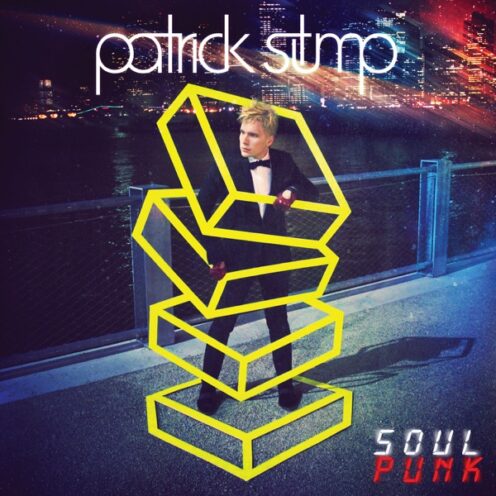
”Go back to Fall Out Boy!”
”Your solo stuff sucks!”
These responses, while ignorant and misguided, unfortunately exist in regards to the solo undertaking of former Fall Out Boy front man Patrick Stump. After the influential pop-punk quartet went on hiatus in 2009, each member went their separate ways. Drummer Andy Hurley and guitarist Joe Trohman formed hard-rock The Damned Things, while bassist Pete Wentz delved into club-centered dance pop in Black Cards. Stump, on the other hand, had a different and the arguably most ambitious vision as to where to take his next step musically.
Throughout Fall Out Boy’s career, a Stump solo endeavor became inevitable. From his remixes of acts like The Sounds and The Higher to his numerous production credits, and not to mention that he was basically the mastermind behind Cobra Starship’s Viva La Cobra, it was clear that a solo project of sorts would appear on the horizon. The only question was what it would actually be comprised of. From his prior experience, it makes sense that Stump’s debut album, Soul Punk, is completely written, produced, and instrumented by him and only him.
Soul Punk is the full-length follow-up to last year’s EP, Truant Wave. Although met with mixed reviews, the public got a solid taste of what his solo venture would consist of: slick pop infused with R&B, influenced much by Michael Jackson and the like, while offering a modern take on the 80’s version of the genre. Because of Truant Wave’s faults, Soul Punkis undoubtedly the more improved effort. Despite it not being a terrible release, Truant Wave’s cuts were more or less b-sides to the album, so naturally those songs appeared much more experimental, as if Stump was still in the process of trying to find his niche. Thankfully, he finds it perfectly on the final product. While most of the EP’s songs appeared sonically scattered, Stump has his eyes set in front of him as the direction ofSoul Punk feels as concise as his music has ever been. The main difference between Soul Punk and Truant Wave is that both had the same idea in mind — but Soul Punk executes it a hundred times better.
Album opener, “Explode,” kick starts the record into full-swing with Stump’s always-inviting vocals. Frantic instrumentation and MJ-esque verses prevail throughout, setting the beginning to the ten track album that is doused with rapid energy. Lead single, “This City,” saw its debut as a remix featuring hip-hop artist Lupe Fiasco. On Soul Punk, Fiasco’s verse is stripped in place of a new one from Stump, partly due to the fact that he wanted this record to be a reflection of his own doing without anyone else. As a result, “This City” flows together much nicer without Fiasco, as his spot seemed to bog the track down a bit. The familiar “Spotlight (New Regrets)” makes its way onto Soul Punk rather than its altered version, “Spotlight (Oh Nostalgia)” (featured on Truant Wave). “New Regrets” takes more of a dancier route than “Oh Nostalgia,” but generally fits the matter of the record more, as Stump’s vocals are a lot stronger and prevalent. Vocals on Soul Punk are easily his best outing to date, proven early in the single-worthy “Dance Miserable,” where the vox absolutely soars. His voice is one that’s worth wishing for as your own when 11:11 strikes, and each song continually proves that more.
Despite Soul Punk obviously going in a different direction than anything in Fall Out Boy’s discography, you can tell that during the writing process, some old habits still remained, but that’s far from a bad thing. “The ‘I’ In Lie” has a better hook than most Fall Out Boy songs in its chorus (“And baby, bang, bang, kiss, kiss / You and I got to put an end to this”), while the eight-minute epic “Run Dry (X Heart X Fingers)” provides familiarity for someone who may find it tough getting into the album’s overall sound. Even though it’s lengthy, its catchy chorus and insanely infectious synth helps to digest the track, making it easily the strongest on the record.
Those two tracks round out the second half of the album well, as the feel-good “Everybody Wants Somebody” is horn-laden and relatable with its “Everybody wants somebody who doesn’t want them” message, whereas closer “Coast (It’s Gonna Get Better)” shows a less spastic side of Soul Punk. It’s a song that’s a little more mellow, yet still holds the record’s typical energetic drive. By the end of it, one thing is for certain: Patrick Stump is no longer “the ex-singer of Fall Out Boy.” He is his own individual — and Soul Punk has made him one of the most intriguing ones at that.
Maybe Fall Out Boy will be going back to making pop-rock gems before we know it. Then again… Folie à Deux could very well be the last album we ever see from them. Regardless, what Soul Punk presents most is the absolute certainty behind one’s work. Nothing is worse than seeing a forced, pressured album that one could sense the artist’s dread in the process of making it. Every song on Soul Punk bleeds confidence and assurance — that these songs are what Patrick Stump is happy creating — music that he’s proud of. After a record like this, he shouldn’t care about anyone who unfairly thinks otherwise, because the best of us can find happiness in just hearing that voice again.
 Explode
Explode